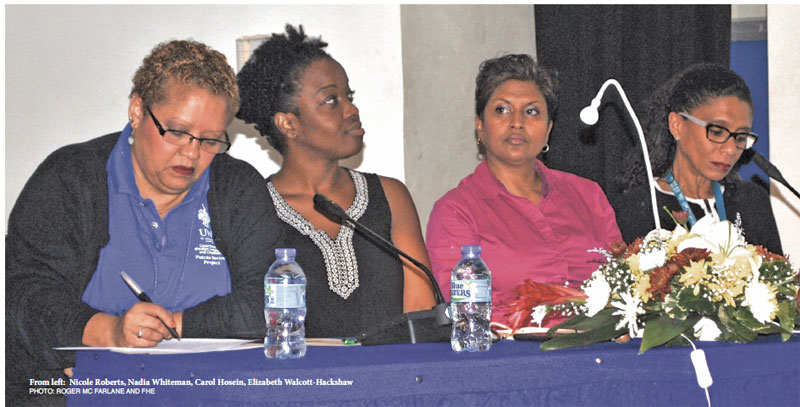 |
 |
 |
|
January 2017 |
The Departments of Literary, Cultural and Communication Studies (LCCS) and Modern Languages and Linguistics (DMLL) jointly presented “Dialogues 2016 – Celebrating post-graduate research” for researchers at different stages of their careers. This year’s event, chaired by Dr Maarit Forde and moderated by Dr Nicole Roberts, centred on MPhil and PhD students whose research showcased how people in the Caribbean societies produce and maintain difference. PhD in Spanish student, Adonis Diáz Fernandez gave the first presentation on his work, “The Afro cosmovision: “Orishaismo,” Afro-Cuban and Afro-Hispanic identity.” Fernandez highlighted the need for naming and classifying the sacred literature of Cuba using transculturation theory as advanced by Fernando Ortiz. This is in an effort to combat stereotypes associated with orishas and to legitimise Orishaism as a genre for literature, arts and film. Charisa-Marie Alexis-Francois, PhD in Cultural Studies, addressed the topic, “Zelophehad’s Daughters: Women in the Catholic Charismatic Renewal Movement (CCRM) in Trinidad.” In the days of the Old Testament women did not inherit property according to Alexis- Francois, thus Zelophehad’s daughters were the first women on record to challenge patriarchal rule since they insisted that their father’s property be transferred to them. It is in this tradition that the women of the CCRM follow. Using interviews to examine the lived experiences of these women, Alexis-Francois examined the basis of female leadership and empowerment in the CCRM and the establishment and features of the community from their pre-call to being fully committed members (post-call). Jamaica took centre stage in PhD in Cultural Studies, Nadia Whiteman’s presentation, “Between the Mainstream and the Alternative: An Ethnographic Analysis of Social Capital and the Politics of Difference in the Jamaican Rock Music Scene.” She highlighted the way mainstream music in Jamaica is used to maintain the local music economy while oppressing other forms of music such as rock and alternative music. Using information obtained from over one year of ethnographic fieldwork in Jamaica, as well as a Jamaican Rock WhatsApp chat group, Whiteman showed how persons who listen to rock are seen as fringe dwellers yet maintain the connected viewpoints to the status quo. She proposed that the suppression of Jamaican rock was also tied to the nation’s connection to blackness and by lessening the rigidity of the Jamaican identity to include rock could have positive effects on the music industry. Fay White, PhD Literatures in English, presented Female Same-Sex Desire and Mother-Daughter Imagery in Caribbean Diasporic Women’s Writings.” She focused on fictional representations of mother-daughter bonding and how they are tied to motherland and Mother Nature as well as female same-sex desire. Using textual analysis, literary and feminist theories White examined books such as Michelle Cliff ’s “Abeng,” Shani Mootoo’s “Out on Main Street,” and Stacey-Ann Chin’s “The Other Side of Paradise,” among others. The final presenter and lone MPhil student, Carol Hosein, from the Cultural Studies programme gave her take in “A Study of the Socio-Cultural Effects of the 1970 Black-Power Revolution in Trinidad.” She stressed the significant socio-cultural impact the revolution had in Trinidad, including religious identities and practice, the creation of a memory trove and proliferation of works in the theatre and the arts. Professor Elizabeth Walcott-Hackshaw weighed in on the discussions, saying that presenters should try to problematize the solidity of identity. The other discussant, Dr Charleston Thomas, advised presenters to consider that in their attempt to challenge hierarchies they should be careful they do not construct hierarchies of their own. During the Q&A session, panelists defended their works by going more in depth about the non-binary ways they fleshed out the concept of identity in their theses.
Jeanette G. Awai is a freelance writer and Marketing and Communications Assistant at the Marketing and Communications Office |


